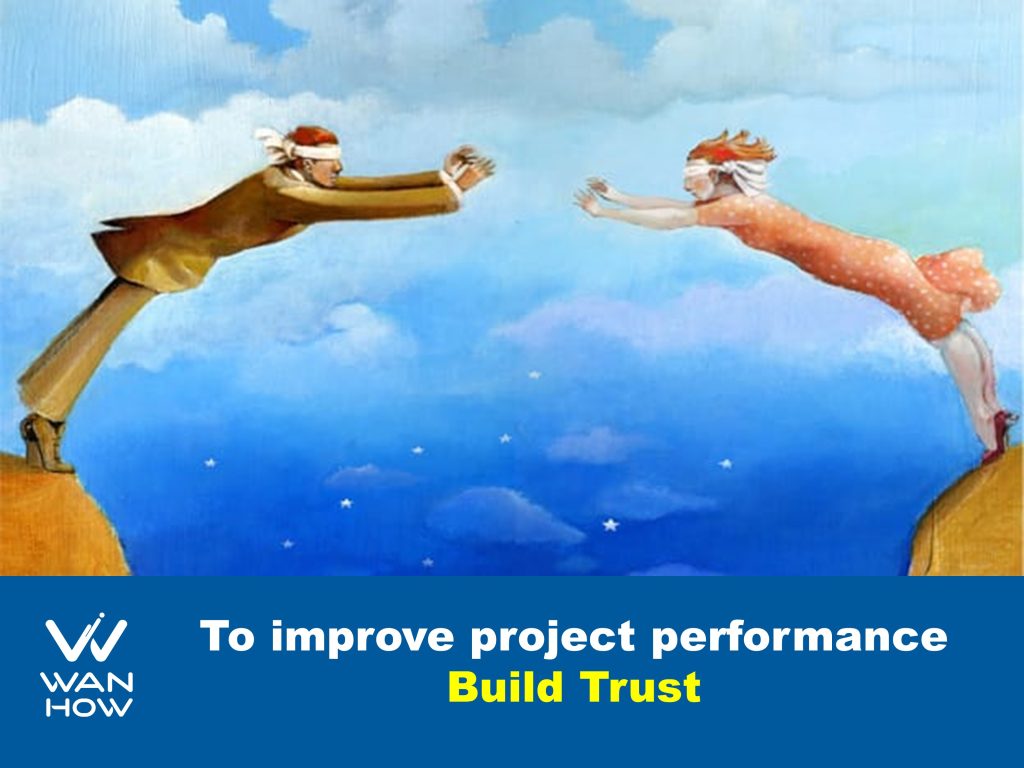
Project managers are trusted to deliver on time, within budget and scope. The longer your track record of successful deliveries, the more executives trust you to deliver the next big, hairy, audacious project. In turn, you need to trust your project team members to complete their action items on time, raise risks before they become issues, and constructively disagree to come up with creative solutions. Here’s a few tips on how to build trust in your project team:
1. The larger the team, the lower the level of trust.
Think about this for awhile. What will you confide in with one person that you won’t share with ten? What will you share with ten persons that you won’t say in front of 100? So while the overall project team may be large to encompass every contributor, keep your core project team as small as possible to cover all the functions you need. These workstream, sub-group, or working committee leads need to be able to work together well in an atmosphere of mutual trust.
One way to gauge the level of trust in your core group is by considering whether they are merely representing their area or function in discussions, or are they thinking and problem-solving as part of the core team?
Do you commonly hear, “I am delivering my part, my area of responsibility” and “that’s your department, it’s not my problem”?
Or do they say, “we are in this together”, “we succeed and fail as a team”, and “we have your back”?
2. Build the foundations of trust with shared values
You can build the foundations of trust by facilitating a shared values workshop. Set aside an hour where your core team writes down a list of their personal, individual values and shares them with the rest of the team. Then as a team, rank the top values everyone shares. Pick the top three and discuss these further. Ask how team members can support each other with these values? If you are the project lead, it is best to have an external facilitator from outside your team facilitate this exercise.
I did this once with my team and one of the top three values that emerged was work-life balance. So we asked how we were going to support each other in this area? Some ideas that emerged were:
- We would cover for each other on sick days and vacations
- We don’t schedule meetings outside of office hours
- We avoid unnecessary communications outside office hours
- We also committed to not schedule vacations during peak project seasons and critical times.
What was the outcome? At the end of the year, we achieved all our project goals even after executive sponsors had given up on some of the stretch goals. We were also known as the team that flew the most travel miles for vacation. We were also the team that got together to celebrate the most!
3. Exhibit and exemplify trustworthy behaviours
As a leader and not just a manager, you build trust by exhibiting trustworthy behaviours such as:
- Correct privately, praise publicly
- Support your team members i.e. when there is no capacity to do the work, you are the capacity!
- Share the limelight. Don’t keep all the high visibility projects for yourself.
- Share the grunt work. Don’t assign all the low-level work to your team.
- Whenever possible, make team decisions that everyone can support vs. lone-wolf dictatorial decisions.
What happens when you exhibit trustworthy behaviour? Your team makes stronger commitments, e.g.
- Team members make personal commitments to deliver on goals that are above and beyond their commitment to the company
- Team members support each other by coaching and mentoring each other so they don’t only rely on you
- As a result of mutual support, the overall team performance improves!
Trust can be wiped out in a day. To build it though, takes many days, weeks, and months. What’s one thing you can do today to build trust?
